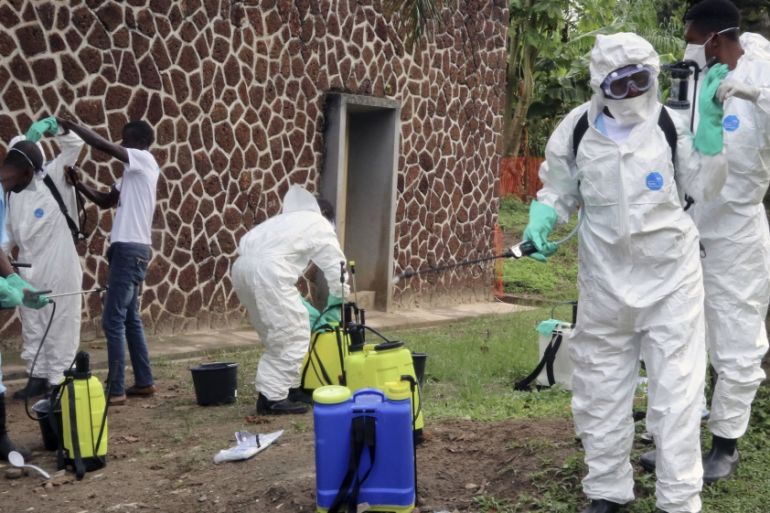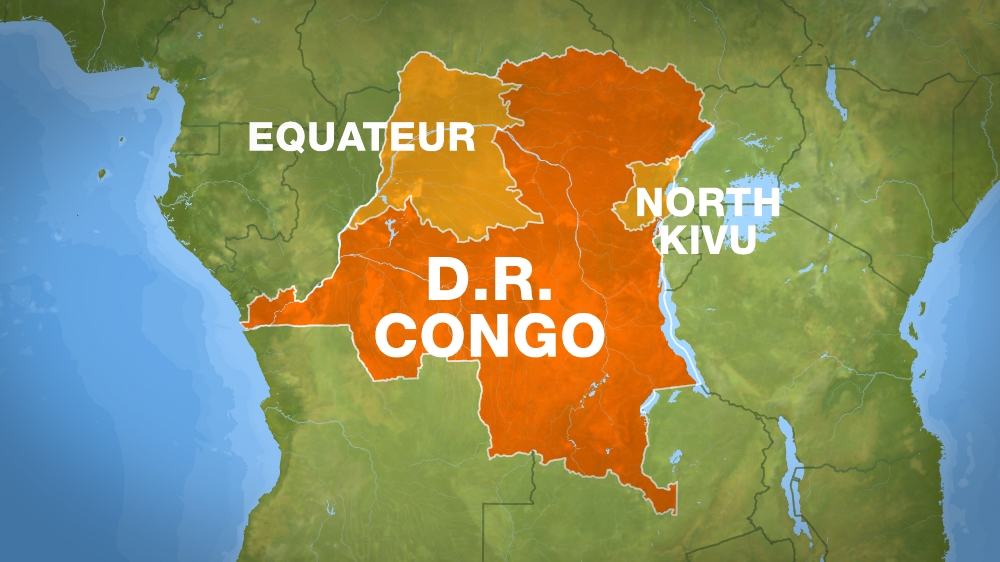DRC: New Ebola deaths confirmed, dozens believed infected
Health ministry says up to 43 people may have contracted the Ebola virus since latest outbreak declared last week.

Ebola is suspected to have caused as many as 33 deaths during the latest outbreak of the virus in the Democratic Republic of Congo (DRC), the health ministry said.
Thirteen cases of the virus were confirmed across northeastern North Kivu province and neighbouring Ituri province, DRC’s health minister said in a statement on Saturday, with another 30 “probable” cases registered.
Keep reading
list of 4 itemsUganda declares end of Ebola after 4-month outbreak
Uganda’s Ebola outbreak nearly under control, says Africa CDC
Ebola vaccines produced lasting antibodies during trial: Studies
Three people were confirmed killed by the virus and 30 suspected Ebola deaths are being investigated since the outbreak was declared on Wednesday.
Laboratory examinations aimed at determining whether the “probable” cases tested positive for Ebola, which has no proven cure, were ongoing.
‘Active conflict zone’
Almost 900 “contacts” – meaning people who may have come into contact with an infected person – have been registered by the health ministry.
Vaccinations were being deployed to the city of Beni, in North Kivu province, the statement said.
However, an “active conflict” in the area could prove to be a “major barrier” to health workers safely accessing the affected population, Peter Salama, a senior World Health Organization (WHO) official, warned last week.
WHO released $2m from its contingency fund for emergencies to help fund DRC’s response to the newest outbreak.
Today our Deputy Director-General for Emergencies @PeteSalama briefed the media on the ongoing #Ebola response in the Democratic Republic of the Congo #DRC.
🎥: @UNGeneva pic.twitter.com/hfGf6zsfSj
— World Health Organization (WHO) (@WHO) August 3, 2018
North Kivu, which borders Uganda and Rwanda, is a resource-rich province in which more than 100 armed groups operate, according to Human Rights Watch. More than one million people are displaced there.
The security situation in the province made any response planning “complex”, WHO spokesman Tarik Jasarevic told Al Jazeera on Sunday.
“Even though we have access to the towns of Mangina and Beni, we don’t know to what extent we’re going to have to rely on armed escorts for broader contact tracing outside those small towns,” Jasarevic said.
“That’s going to be a critical determining factor in our ability to respond.”
‘Unsecured burial’
Authorities were alerted to the DRC’s most recent Ebola outbreak – its tenth since 1976 – by the death of a 65-year-old woman in Mangina, a town about 30km west of Beni, last month.
After her “unsecured burial”, relatives of the woman also displayed symptoms of the virus, seven of whom died.
Ebola is a virus-caused hemorrhagic fever that in extreme cases causes fatal bleeding from internal organs, the mouth, eyes or ears. The average fatality rate among those infected is about 50 percent, according to WHO.
The latest outbreak comes after DRC officials declared an Ebola crisis in northwestern Equateur province over on July 24. That outbreak in May killed 33 people with 54 confirmed cases.

Health officials said a quick international response and the vaccination of more than 3,300 people were decisive factors in containing the virus.
The worst Ebola epidemic occurred between 2013 and 2016 when it killed about 11,300 people in West Africa as it surged through Guinea, Sierra Leone, and Liberia.
Ebola is passed from human-to-human by contact through the mouth, nose, or broken skin with blood or other bodily fluids by those infected.
Humans contract the virus – which takes its name from the DRC’s Ebola River – from infected animals, typically fruit bats, chimpanzees, gorillas and monkeys.
![Ebola explainer May 20 2018 [Al Jazeera]](/wp-content/uploads/2018/05/8dbb12a55be443fa8414ecdf840604d2_6.jpeg)